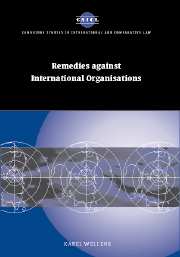Book contents
- Frontmatter
- Contents
- Acknowledgements
- List of abbreviations
- Introduction
- Part I General features of remedies against international organisations
- Part II Procedural aspects of remedial action against international organisations
- Part III Substantive outcome of remedial action against international organisations
- 13 General features of remedial outcome
- 14 Remedial outcome for staff members
- 15 Remedial outcome for private claimants
- Part IV Alternative remedial action against international organisations and options for the future
- Conclusion
- Bibliography
- Index
- CAMBRIDGE STUDIES IN INTERNATIONAL AND COMPARATIVE LAW
13 - General features of remedial outcome
Published online by Cambridge University Press: 13 July 2009
- Frontmatter
- Contents
- Acknowledgements
- List of abbreviations
- Introduction
- Part I General features of remedies against international organisations
- Part II Procedural aspects of remedial action against international organisations
- Part III Substantive outcome of remedial action against international organisations
- 13 General features of remedial outcome
- 14 Remedial outcome for staff members
- 15 Remedial outcome for private claimants
- Part IV Alternative remedial action against international organisations and options for the future
- Conclusion
- Bibliography
- Index
- CAMBRIDGE STUDIES IN INTERNATIONAL AND COMPARATIVE LAW
Summary
The general features of remedies against international organisations have been described in Part I of this study. Once claimants are considering taking remedial action against an international organisation their different status vis-à-vis the organisation will have important consequences on the procedural level; that was the focus of Part II. Part III is devoted to a general picture of the substantive outcome of remedial action undertaken by non-state claimants.
The relationship between the specific features of member states and the various levels of accountability has been analysed in the first two sections of chapter 3 in Part I. There is no reason to believe that there are additional, membership-linked features of remedial outcome other than the ones described in this current chapter. As to representational non-governmental organisations, there is no remedial outcome as remedial mechanisms are not open to them. Accordingly, neither category of claimants is included here.
The substantive outcome portrayed in Part III is not specific to remedial action against international organisations, as demonstrated by claims against states under secondary rules of liability/responsibility. That the range of available remedial outcomes is almost identical is not surprising because the situations giving rise to organisational liability/responsibility do not substantially differ merely because of the identity of the actors involved. The surrounding circumstances and the modalities of the alleged harm/violation may vary, but that will not necessarily limit the availability or selection of the remedial outcome.
- Type
- Chapter
- Information
- Remedies against International Organisations , pp. 135 - 146Publisher: Cambridge University PressPrint publication year: 2002

